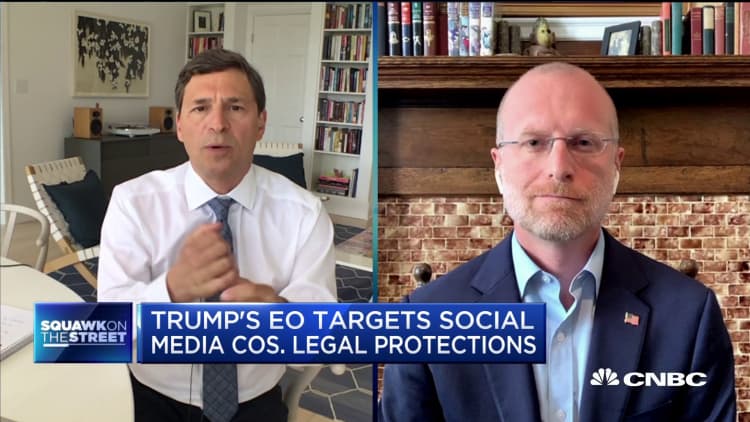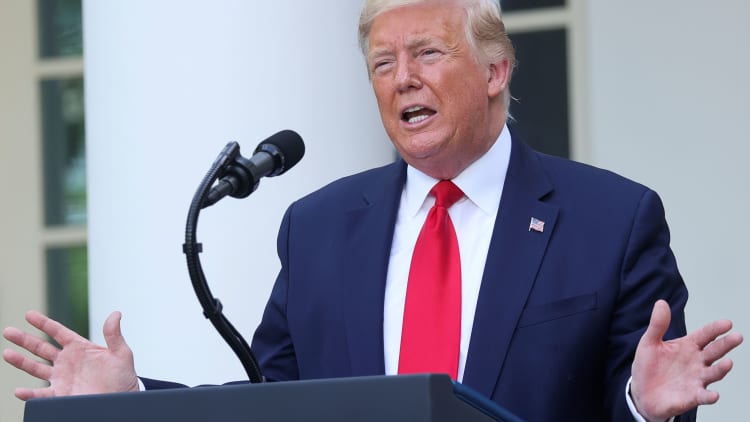Republican Federal Communications Commissioner Brendan Carr said Twitter CEO Jack Dorsey is "weaponizing" the company for "his own partisan political beliefs."
Carr, who was nominated by President Donald Trump in 2017, made the charge during a Monday interview on CNBC's "Squawk on the Street" about Trump's new executive order on social media. The order targets a 1996 law that shields tech companies from liability for their users' posts and empowers them to engage in "good faith" content moderation. Members of Congress from both parties have criticized the law, known as Section 230, in recent years as tech companies have grown in size and influence while attracting greater scrutiny for their competitive practices and content moderation standards.
But politicians tend to be split along partisan lines over their reasons for reforming the law. While Democrats supporting reforms generally aim to hold tech platforms to similar standards as publishers when it comes to what they see as objectionable content, Republicans have taken issue with what they claim is a biased method of removing content that silences conservative voices. Tech platforms have repeatedly denied removing content based on partisan beliefs.
In his interview Monday, Carr said Facebook CEO Mark Zuckerberg was generally taking a better approach on content moderation than Twitter's Dorsey.

"I think Zuckerberg is right, Facebook is wrong. It's kind of veered from some of Zuckerberg's instincts from time to time," Carr said. "I think there's been a big distinction that last couple weeks between Facebook and Twitter where Mark Zuckerberg has said, look, put my political beliefs to the side and he's been expressing them and good for him, that's not how I'm going to support my business, my business is about supporting free speech. Contrast that with Jack Dorsey who looks like he's now weaponizing his corporation to pursue his own partisan political beliefs."
Twitter placed a "public interest notice" over a recent tweet by Trump for the first time, obscuring a message about the protests in Minneapolis over the killing of George Floyd while in police custody. Twitter said Trump's post, which said, "when the looting starts, the shooting starts," violated its policies about glorifying violence. While the company would normally remove such a post by other users, Twitter invoked its June 2019 carve-out for world leaders, which allows it to maintain posts from such figures that are in the public interest but otherwise violate its policies.
Facebook, by contrast, left the same message up on its platform, angering usually quiet employees who took to Twitter to share their disagreement with the company's decision. Zuckerberg spoke with Trump on the phone about the protests on Friday, a source confirmed to CNBC. Axios, which first reported the news, said both parties characterized the call as productive.
Still, Carr criticized Facebook on other grounds, including the makeup of its new oversight board that's charged with adjudicating complicated content decisions on the platform. He called out the inclusion of Pamela Karlan, a constitutional law expert at Stanford University who testified in front of the House Judiciary Committee as part of the impeachment inquiry into Trump.
Addressing the question of how the perceived political makeup of tech companies should factor into the assessment of bias, Carr said, "I think at least from a public policy perspective, if you were holding yourself out there as a neutral platform, at least from a political perspective, and then you stack the deck with hardened partisans, I think that undermines -- putting the government hat aside -- I think that undermines the user-base's confidence."
Facebook did not immediately respond to CNBC's requests for comment. Karlan and Twitter declined to comment.
Trump's executive order was widely criticized by the tech industry, which claimed the order would backfire by forcing tech platforms to further limit speech to stem their liability risk. Democrats, even those who have supported potential reforms to the law, claimed the order was a distraction from the ongoing coronavirus pandemic that has taken more than 100,000 lives in the U.S., disproportionately impacting black Americans.
WATCH: Trump to sign executive order aimed at cracking down on Facebook, Twitter



